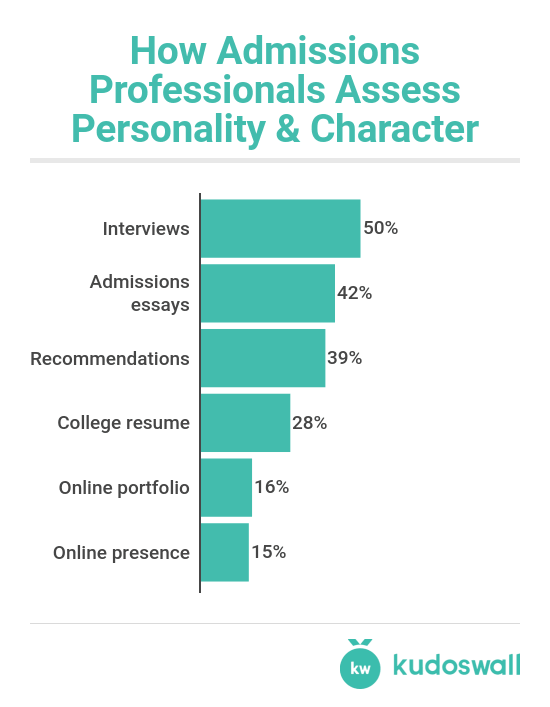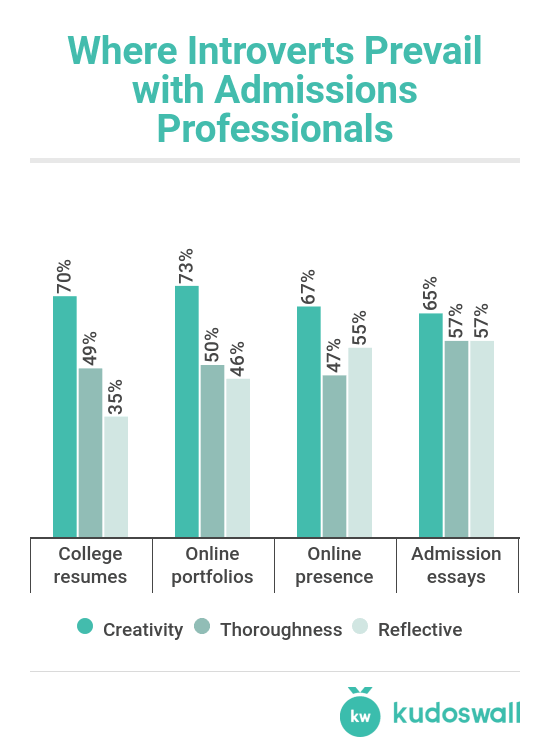College is often the next step for high school students. In fact, 2016 research from the National Center for Education Statistics found that 70 percent of high school students enrolled in college the same year they graduated. However, competition is heating up. Research from the National Association for College Admission Counseling found that 39 percent of institutions reported using a waitlist in Fall 2016. It also found that the average selectivity rate was 66 percent for Fall 2015. As college admissions professionals are getting more selective, they’re using new strategies that look beyond grades and test scores. For example, Columbia University uses a ‘holistic’ admissions process that also looks at aspects like candidate fit, character, and personality.
The experts at KudosWall wondered if the use of personality testing and character skills assessments in the admissions process favored certain personality types. So, they conducted a survey to find out: Making the Grade: A Look at How Personality Affects College Admissions.
Key Findings
Nearly nine out of 10 admissions professionals say personality and character skills assessments are important to a candidate’s admittance. Aside from academic achievements, admissions professionals value college resumes and admission essays the most. Introverts are better equipped to highlight their traits and strengths on paper through materials like college resumes, admission essays, and online portfolios. Extroverts let their unique traits shine through other aspects of the application process, like earning recommendations that highlight their teamwork skills.
Every person falls somewhere on the introvert-extrovert spectrum, possessing traits from both personality types. High school students who are preparing for college should understand what personality traits they possess so they know how to stand out in the college admissions process. Our report found that 86 percent of admissions professionals say an applicant’s personality and character skills assessments play a big role in the admissions process. To make the most of their personality traits, students need to think like admissions professionals and understand how to leverage their personality.
Looking Beyond GPAs and SATs
High school students who focus on academic achievements — like earning high grades and scoring well on standardized tests — are preparing for college. However, admissions professionals look at more than just these aspects. Our survey found that admissions professionals put the most value on college resumes, admission essays, online portfolios, and recommendations.
What’s more, a whopping 66 percent of college admissions professionals say they use personality testing and/or character skills assessments during the admissions process. For those without formal testing and assessments, they still evaluate for character and personality through other practices, like conducting interviews, reviewing admission essays and recommendations, and looking at college resumes.

How do admissions officers assess personality?
When admissions professionals need to know more about a student’s personality, they look at two aspects: what students say about themselves and what others say about them. Students should build an online presence that is consistent and easy to access. Use a personal website to share a portfolio of accomplishments and display recommendations from teachers or employers. Also, don’t forget the value of putting a face to the name. Students can record short vlogs to explain how they completed a project or what they learned at an event. This way, admissions professionals can see and hear from applicants even before they contact them.
Where introverts prevail
Those with introversion qualities tend to have advantages in several aspects of the admissions process. In fact, when it comes to written materials and aspects that don’t involve one-on-one interaction, they shine. In college resumes, online portfolios, admission essays, and online presence, most admissions professionals favor one introvert trait: creativity. What’s more, creative applicants might even outshine those with better grades: 72 percent of admissions professionals say they accepted applicants who submitted a creative admission essay over those who have better academic qualifications but failed to convey passion. Additionally, introverted students tend to have better focus for longer periods of time. Their focus and natural attention to detail pays off: 71 percent of admissions professionals say they reject candidates who do not follow all the directions in the application process.
Introverted students can create and share a presentation that highlights what they know about a university’s values, culture, history, and mission. Then, they can describe how their personal values fit the culture. This shows their enthusiasm through a creative project.

Where extroverts prevail
Extroverted students also have advantages in the college admissions process, especially their ability to take action. When admissions professionals reach out directly, 94 percent of them prefer applicants who take the initiative to follow up.
Also, team-players, which align with extrovert types, stand out amongst the competition. Nearly half of admissions professionals say they highly value applicants who submit recommendation letters that describe the applicant as a team-player. What’s more, 87 percent prefer applicants who demonstrate success in group environments. Another aspect admissions professionals look for is potential, and seven out of 10 say applicants who exhibit leadership skills have the highest potential.
Extroverts are often the go-getter. The social butterfly. The project leader. This comes out naturally in person, but it’s hard to showcase on paper. Instead, students should develop a personal branding strategy that showcases their leadership qualities through various forms of content. For example, they can post videos of their accomplishments, like leading a debate team or playing a team sport.

How can you use this information to help your student?
The good news is that students who are naturally introverted or extroverted have plenty of opportunities to stand out during the college admissions process. First, determine where your personality traits lie. There are several personality assessment tools and tests to take, such as 16 Personalities. From there, identify an action plan for showcasing your traits as strengths to college admissions professionals. This includes personal branding. It’s never too early to start building an online presence to share accomplishments and connect with communities online. Use your online presence, which includes social media, online portfolios, personal websites, and more, to present the most authentic version of yourself. By the time admissions professionals reach out to you, they will know you’re the perfect fit.
KudosWall is an online achievement portfolio and resume builder designed for kids, teens, and their parents to keep track of achievements.

It’s an awesome article and the entire content is very informative.
Thanks a lot of elaborating all the points in detail and thoroughly.
You are right i don’t know what is our child personality type. This is important We must know this what is personality type of our child. I found your website just right for my needs. Your information very helpful for me. Thanks a lot for this beauty Enjoying article with me. I appreciate it very much!